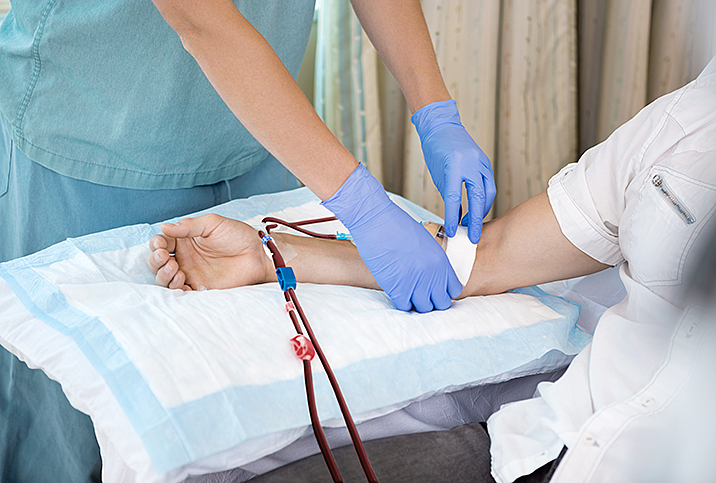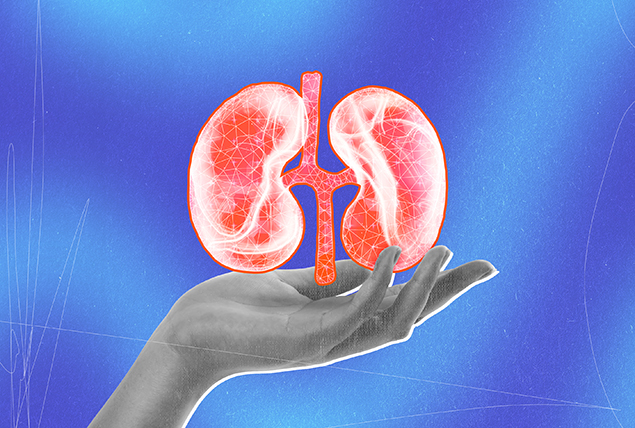Recognize the Signs and Symptoms of Kidney Disease

Chronic kidney disease (CKD) is a major concern in the United States and one of the more expensive diseases to treat. More than 1 in 7 U.S. adults suffer from the disease. Additionally, kidney disease is slightly more common in women, at 14 percent, than in men, at 12 percent, according to a 2021 report by the Centers for Disease Control and Prevention (CDC).
CKD is characterized by a gradual failure of the kidneys' ability to filter out waste in the human body. People find themselves at a higher risk for kidney disease because of underlying factors, like genetics, or other health concerns, such as diabetes, high blood pressure and autoimmune diseases.
Chronic kidney disease can also affect your sexual health. According to a study published in 2015, up to 70 percent of men with end-stage kidney failure experience some level of erectile dysfunction (ED). People with CKD also can experience menstruation irregularities, infertility and decreased sex drive.
Early detection is key, and so is addressing any symptoms you suspect could be related to kidney function.
"When your kidneys start having problems, it really influences all your other organs as well," said Kelly McNagny, Ph.D., a kidney health-focused researcher at the University of British Columbia.
What are some symptoms of kidney disease?
Symptoms of kidney disease typically develop over time as a person's kidney function gradually declines. One of the effects of decreased kidney function is an increased number of toxins in your body due to the kidney's inability to filter them out into the urine, which brings about common symptoms such as nausea and vomiting, often accompanied by a loss of appetite.
Other symptoms of kidney disease include fatigue, weakness, sleep problems and decreased mental sharpness, according to Mayo Clinic. Some people may also experience muscle cramps and swelling of the feet and ankles.
McNagny noted that people are typically diagnosed when they report pain in the lower back region, where the kidneys are located. Increased or decreased urination accompanied by pain or bleeding is also a sign there may be something wrong with the body's kidney function.
Often, an increased level of creatinine levels in the body—a breakdown product of creatine phosphate from muscle and protein metabolism—could indicate there's something wrong with the kidney's filters, McNagny added. However, people won't know for sure until they visit a doctor and have blood and urine tests.
How to diagnose kidney disease
Blood and urine samples are some of the most common testing methods for kidney disease. McNagny added that while the damage can be diagnosed by locating protein in the urine, the hardest part is finding the cause.
"The most frequent diagnosis is through a biopsy," he said. "They put a little needle into your kidney, take out a tiny little aspect of cells and try to look at the architecture and see if something looks wrong with the architecture of a little piece of your kidney."
Biopsies can be time-consuming, he added. One reason is that there are times when a biopsy isn't taken from a large enough sample or is taken from the wrong area, which would require a "redo."
In some instances, imaging tests, such as ultrasound, may also be used to assess the kidney's size and structure.
When should I see a doctor?
Most people who experience pain or symptoms go to their general practitioner or family doctor. From there, you may be referred to a nephrologist or a kidney specialist, McNagny noted.
If you experience pain or discomfort as a dull, one-sided ache in the upper abdomen, side or back, you have fever, body aches and fatigue, or you've recently had a urinary tract infection (UTI), you should schedule an appointment with your healthcare provider. But if you develop sudden, severe kidney pain, with or without blood in your urine, visit the emergency room.
For individuals with concerns such as diabetes and hypertension (high blood pressure), your doctor can order tests for your kidneys as part of your annual checkups. People with a family history of kidney disease or ones with a genetic predisposition should undergo tests regularly to monitor kidney function. McNagny mentioned that letting your doctor know about your history and concerns can help because you'll get extra attention in that area.
The importance of a timely diagnosis
"The longer you wait, the worse it is," McNagny said.
Your treatment options are better with an early diagnosis. For example, if you have an autoimmune disease, you can take medication that dampens your autoimmune response and prevents damage to your kidneys. In cases such as hypertension, you can take medication that lowers your blood pressure and puts less strain on your kidneys.
Visiting a doctor regularly and making necessary lifestyle alterations can help delay progression.
A late diagnosis, one received after your kidney function has reduced drastically, could mean needing treatment in the form of dialysis or transplant.
Dialysis is a regular procedure used to remove waste products and excess fluid from the blood when the kidneys can no longer do so. It often involves diverting blood to a machine to be cleaned. The process is required as much as three times per week, with each session lasting three to four hours.
While dialysis is an effective short-term treatment, it can be inconvenient for living an active life.
It should be noted that dialysis is an expensive treatment, accounting for about 7 percent of the United States' Medicare budget, according to the 2018 annual report from the U.S. Renal Data System.
Myths and misconceptions
McNagny explained that not everyone with kidney disease progresses to the transplant stage if they're diagnosed and treated early, and that's likely the biggest misconception associated with the disease.
Transplantation or having a kidney removed is not something to fear. If you have one bad kidney, then the other can take over, but he also noted that a kidney transplant is not a cure for kidney disease.
"When you do have a transplant, you will frequently have to be on anemia suppression, which also has a lot of side effects," he added.
If you can delay a transplant by seeing doctors regularly and making lifestyle changes in ways that prevent your kidney disease from progressing, that's obviously the best-case scenario.


















